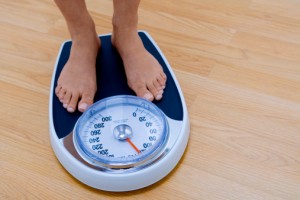Feeling Full on Fewer Calories
One of the biggest obstacles you'll encounter while cutting back on calories is feeling full throughout the day. Hunger will sneak up on you when you least expect it, and it's best to be prepared to avoid overeating when you're trying to lose weight. A few simple strategies can help you feel full throughout the day while on a reduced-calorie diet.
Fill Up on Fiber
Fiber is going to be your best asset to feeling full throughout the day. Fiber is a component of fruits, vegetables, legumes and whole-grain foods. Your body can't fully digest fiber but fiber will bulk up your meals and make you feel fuller for longer. Foods high in fiber also take longer to chew, slowing down your eating and allowing your brain to really gauge how full you are, which prevents overeating. To avoid bloating, gas and constipation, be sure to increase your fiber intake slowly and drink plenty of fluids.
 Hydrate with H2O
Hydrate with H2O
Staying hydrated while reducing portion sizes can aid in weight loss. Drinking water, especially before meals, will fill your stomach, making you feel full and reducing the likelihood that you will overeat. Additionally, people can mistake thirst for hunger, causing them to eat when they aren't truly hungry. This could sabotage weight-loss efforts. Carry a reusable water bottle and sip throughout the day, refilling often.
 Pack Your Plate with Produce
Pack Your Plate with Produce
Because fruits and vegetables contain large amounts of water but provide minimal calories, you can eat a large volume of these foods without going over your calorie budget. Cutting portions can be difficult, but you can eat large amounts of non-starchy vegetables to fill your stomach, which probably became accustomed to larger portions in the past. Produce is also packed with fiber, a weight-loss ally.
Pile on the Protein
Protein takes a long time to digest and metabolize and also burns more calories in the process. Studies have also shown that protein may satisfy your hunger better than carbohydrates or fats. Feeling satisfied throughout the day is vital for sticking to a reduced-calorie diet. To maximize protein's fat-busting potential, be sure to consume a good dose of protein for breakfast.
It's also essential to consume enough protein while you're dropping pounds in order to stave off muscle loss. Up your protein intake so that your body can use the amino acids to build and maintain lean muscle mass.
Burst Your Own Bubble
It may sound silly, but research has shown that chewing gum can control your cravings and help you handle hunger, which may help you lose weight. In several studies, chewing gum helped participants resist fattening snacks, satisfy their cravings and reduce total daily caloric intake by around 40 calories. Chewing gum can be especially helpful if you chew a piece of sugar-free gum instead of a high-calorie dessert or snack.
 Exercise for Thinner Thighs
Exercise for Thinner Thighs
Research has revealed that aerobic exercise has the ability to suppress appetite-stimulating hormones. Additionally, we know that exercise burns calories and builds lean muscle, which torches calories even while your body is at rest.
Kari Hartel, RD, LD is a Registered Dietitian and freelance writer based out of St. Louis, MO. Kari is passionate about nutrition education and the prevention of chronic disease through a healthy diet and active lifestyle. Kari holds a Bachelor of Science in Dietetics from Southeast Missouri State University and is committed to helping people lead healthy lives. She completed a yearlong dietetic internship at OSF St. Francis Medical Center in Peoria, IL, where she worked with a multitude of clients and patients with complicated diagnoses. She planned, marketed, and implemented nutrition education programs and cooking demonstrations for the general public as well as for special populations, including patients with cancer, heart disease, diabetes, Alzheimer's disease, obesity, and school-aged children. Contact Kari at [email protected].
-
Perricone Weight Loss Diet
The Perricone diet, named after its author Nicholas Perricone, is bas
-
Help For Availing A Perfect Fitness Training
There are unlimited fitness programs available today which help users
-
Find The Best Weight Loss Products
The surge of weight loss products in the market is truly maddening. I
-
Easy Weight-Loss – Weight Loss Tricks – Weight Loss Tips
Are you struggling to loose Weight? If you are then you are not a
-
Do you have arthritis?
Copyright 2005 Lambert KleinDo you have arthritis? If so you are n
-
Try These Tips To Burn More Fat Per Week
From time to time i tend to receive emai
- DON'T MISS
- Will Low Carb Diets Work?
- Omega 3 Weight Loss Link Revealed
- The Way To Get Over Overeating
- Lose Weight With Hypnosis – Discover The Performance Of That Innovative Approach
- Sleep Well And Lose Weight
- 5 Things I Miss About Weighing More Than 300 Pounds
- 12 Mental Tricks to Beat Cravings and Lose Weight
- How does lemon help in weight loss
- IF DIETS WORK HOW COME SO MANY PEOPLE ARE OVERWEIGHT?
- Emotional Eating - Did Cinderella Have A Good Press Officer?




